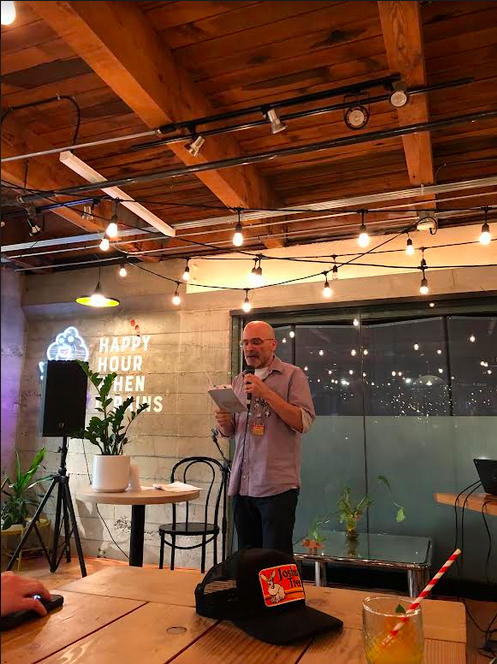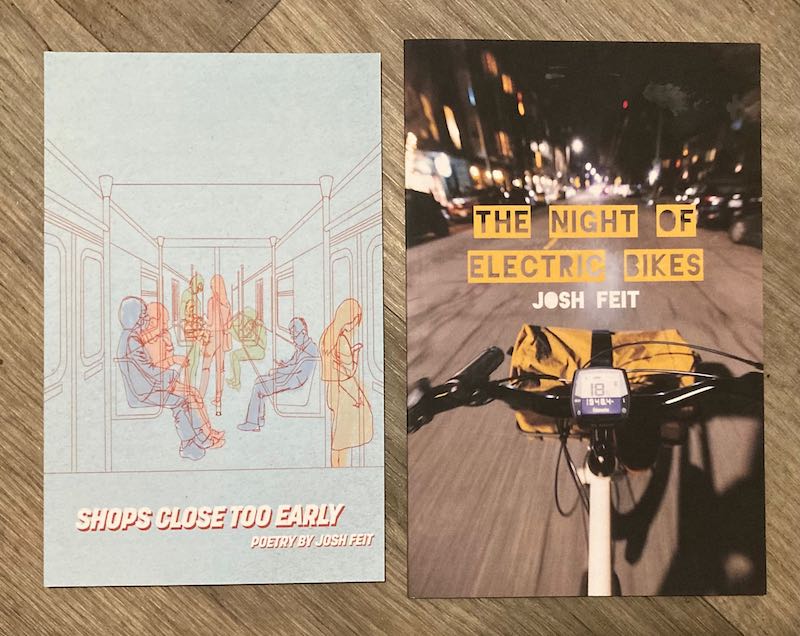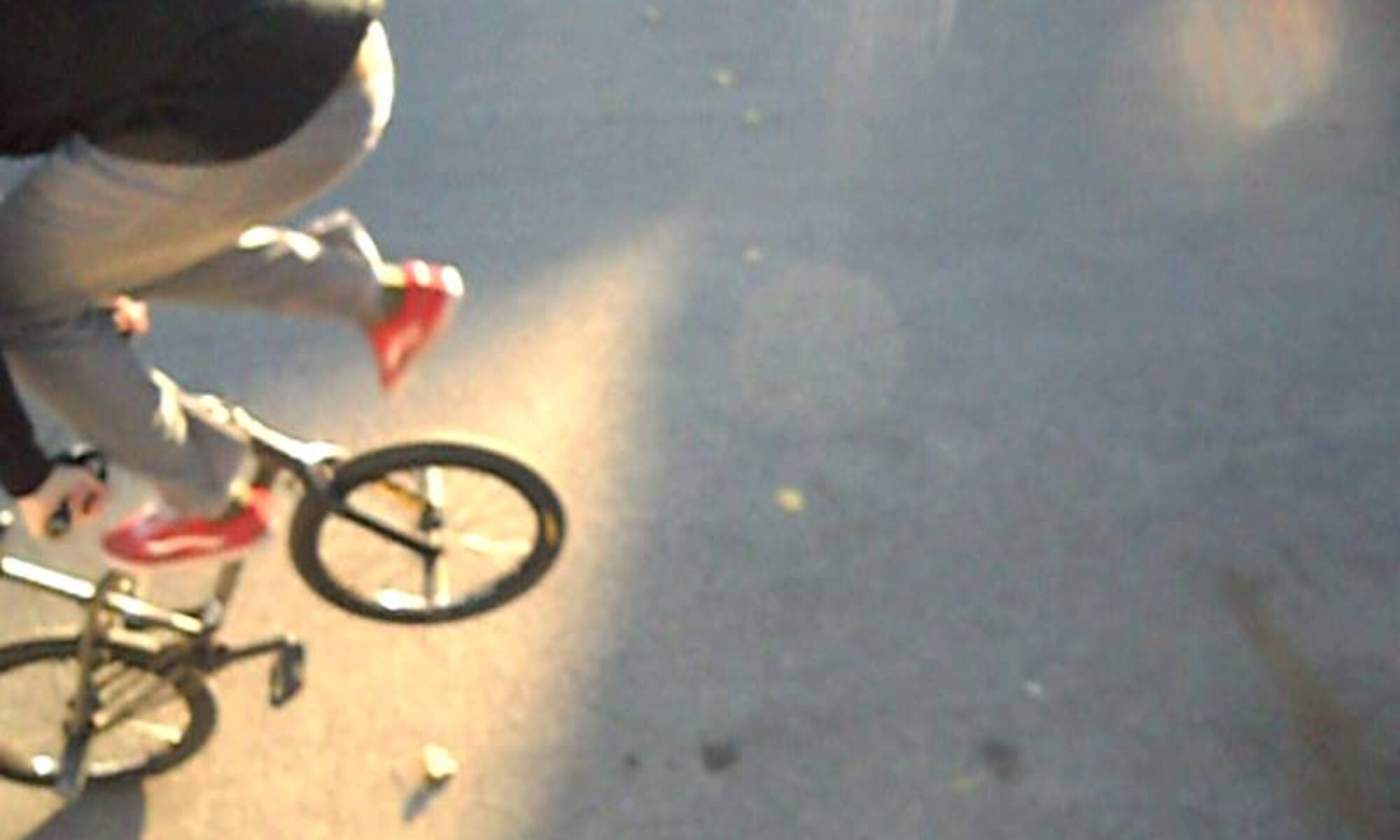My introduction to Josh Feit’s work was through The Stranger, Seattle’s longest running alternative publication. There’s a line from an article he wrote about Brittany Spears for their “Yes, Logo” special issue in 2002 that I had quoted so often, I had memorized. I recited it to him when we finally met in 2019: “Authenticity comes from the moment you’re living in, not from the product you’re buying.”
Feit has moved on to other creative work, most notably poetry. The Night of Electric Bikes (Finishing Line Press, 2023), his latest collection, meanders through urban terrain, wandering with wonder. About it, I wrote,
Josh Feit notes herein that urban planners call the time commuters have to wait for mass transit “dwell time.” The Night of Electric Bikes is dwell time well spent, like no matter where you’re headed, you’re already on your way. As Feit writes, “You have arrived. Your destination is found in others.” These poems are sidewalks and streets and cities made of stories, and within them, many more to explore. Take your time, the next one will be along soon.
His first collection was Shops Close Too Early (Cathexis Northwest Press, 2022), and he’s working on a new one now. I find it fitting that I committed Feit’s words about authenticity to memory, since capturing that authentic moment is the ultimate pursuit of poetry.
Roy Christopher: I got to know your written work originally through The Stranger. When did you start writing poetry?
Josh Feit: It’s fitting that you mention the time I worked as a news reporter. I spent years in the newsroom before I ever started writing poetry, but the whole time, I felt there was something poetic in the policy debates I was covering. People were clashing over how they wanted their city to work in a way that seemed almost existential. Anything from parking regulations, to a proposed employee head tax, to should we allow more density in the neighborhoods? The debates were so emotional. Where should the light rail station go? These technical discussions about dry subjects like zoning turned the cityscape into a personal canvass for people, and suddenly the discussions became metaphors for larger questions about living life itself.
These policy matters started segueing into verse for me when I was working as a speechwriter in the mayor’s office and my brain was spending more time in the margins of the Word doc on my computer screen where I imagined adding fanciful footnotes about: how mixed use development can be piano nocturnes and daffodils; how exclusionary zoning was a suspension of habeas corpus; and how sustainability was Billie Holiday at the Spotlight Club. The city planner is a DJ!

RC: Speaking of, tell us about The Transit Singles.
JF: The Transit Singles! Oh, man. That’s an old project; very early poems that I’m not eager to share. Those videos are buried on the internet, somewhere. So, props to your detective chops for even finding those. But I’m still proud of the conceit. That was a musical outing more than a poetic one. The idea was to pair a poem with a transit oriented pop song re-imagined and performed as a Billie Holiday era nightclub piano ballad; for me, Billie Holiday’s small club dates in 1930s and ‘40s Manhattan are one of the crowning achievements of human kind’s city experiment. In my poems, I’ve cast her as replacing Athena as the Goddess of Cities.
For the pop songs, I went with Kris Kross’ “I Missed the Bus,” Lord Kitchener’s “Underground Train,” Berlin’s “Riding on the Metro,” Le Tigre’s “My My Metro Card,” and The Kinks’ “Waterloo Sunset.” I asked a pro-pianist diva, Leah Tousignant, to cover and record these songs Billie Holiday-style, and then I had an electronic musician Paco Cathcart of the Cradle make samples and loops out of my readings and float them underneath the songs. Kind of a mess. But the great thing is it led to a wonderful idea a few years later. For The Night of Electric Bikes book release reading this past spring, I asked Seattle electronic musician Rob Joynes to open the reading with ambient covers of a few transit pop songs; we went with a mid-60s set, The Impressions’ “People Get Ready (There’s a Train a-Coming),” The Hollies’ “Bus Stop,” and the Beatles’ “Ticket to Ride”). He showed up with his effects boxes and cords and laptop and big speakers and played a gorgeous set, singing the tunes over his atmospheric waves and drones with a dynamite female vocalist Malia Seavey accompanying him and his loops. The gig was at a local bike shop. It was a dream, so no recording.
RC: How did you come to focus on transit in Seattle?
JF: Transit was one of the topics that was always central to the city debates I had been covering as a reporter. And when I dug into the technical details of making transit systems work better, ideas like center platforms, pedestrian scrambles, road diets, and faster headways, the palette of metaphors expanded exponentially. This gave way to poems like “Dwell Time,” where the time we spend waiting at the bus can become a larger narrative about yearning.

RC: That idea of “dwell time” really stuck out to me from The Night of Electric Bikes. The simple acknowledgement and further exploration of the interstitial spaces in our cities feels tangible to me as someone who hasn’t had a car in 25 years. Walking, riding a bike, or taking the bus or train puts you in places that cars can’t go. It’s a different city!
JF: Lovely. Yes, and speaking more literally of interstitial spaces: This is how you bike home in Seattle, along interstitial streets, ever delusional you’ll find a route that avoids the hills. It’s great, though. In this way you’re always zigzagging along back streets you’re unlikely to ever find driving in a car. Now that I know these routes, I do ride my new bike, my e-bike, along these quiet streets during late-night biking adventures home.
RC: What’s coming up?
JF: I’m working on a sequence right now that features wayfinding poems; poems that chart and navigate trips. They’re set up like file path directions: “Bike north on Beacon Ave > West on S Columbian Way > ricochet off the pavement craquelure > live to tell> > continue onto 15th Ave S > …”
Over the course of the collection, these wayfinding poems become less about city geography, and start to chart other paths: events that lead to events, books that lead to books, thoughts that lead to memories.
These shorter wayfinding poems are paired with larger poems about retail kiosks in subway stations, ancient Athens, Joshua Tree, The Autobiography of Malcolm X, affordable housing, kiss and rides, greenhouses, Hermes, and other city subjects.


